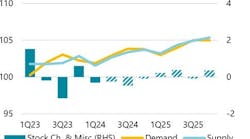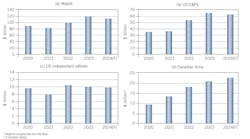Two members of Congress urged the US Commodity Futures Trading Commission to establish and enforce position limits for all energy commodities as opening witnesses at the first of three CFTC hearings on the matter.
US Sen. Bernard Sanders (I-Vt.), who questioned CFTC Chairman Gary G. Gensler’s commitment to regulate aggressively as the Senate considered Gensler’s nomination, began by conceding that Gensler’s actions since taking the CFTC’s helm have been impressive. “But they will all be for naught unless they are followed by aggressive actions by the CFTC to prevent excessive speculation in oil and gas trading,” Sanders warned.
US Rep. Bart Stupak (D-Mich.), chairman of the House Energy and Commerce Committee’s Oversight and Investigations Committee, concurred with Sanders, stating, “A number of reports, market experts, and regulators agree that reform of the derivates market is necessary. Physical hedging, long used to provide liquidity, transparency, and set market prices, is no longer possible due to the manipulation action of financial traders.”
Other witnesses warned that adopting regulations that are too strict could damage markets. “We have not seen empirical evidence that index funds and speculators distort prices, as has been widely alleged, nor is there any proof that putting position limits on these market participants will have any positive effect,” said Craig Donohue, chief executive of CME Group, the parent company of the New York Mercantile Exchange. “We are deeply concerned that inappropriate regulation of these markets will cause participants to move to dark pools and other unregulated markets, causing irrevocable harm to the entire US economy.”
Ben Hirst, senior vice-president and general counsel for Delta Airlines, testified on behalf of the Air Transport Association of America. He said, “The objective should be to allow sufficient speculation to provide sufficient liquidity to enable the market to function efficiently, and no more. While it may not be possible to determine this limit with scientific precision, a reasonable surrogate might be the level of speculative activity on regulated exchanges 10 or more years ago, before the recent explosion of speculation in commodities.”
Clear skies and storms
In his opening statement which began the hearing, Gensler said he thought CFTC should seriously consider setting position limits in energy markets. “As a regulator, we have to ensure for market integrity both when the skies are clear and when there are storms on the horizon. As we consider the effects of large, concentrated positions on the markets, our regulations should address times of volatile or uncertain markets as well as when the markets are stable,” he said.
Gensler added that he was pleased to read in Donohue’s written testimony that CME supports adoption of a hard-limit regime, including single-month and all-months limits, calling it a significant development. But Gensler added that three basic questions remain: What formula should be used to determine where position levels are set? Should they be set by the CFTC or by individual exchanges? Should noncommercial exemptions be provided for financial risk management?
Gensler noted that in CFTC’s position limit exemptions for agriculture commodities, there are three different categories: commercial parties with physical inventory and sales, commercial parties with physical anticipatory needs, and noncommercial entities such as swap dealers. “The commission is taking a close look at whether to eliminate these hedge exemptions for certain swap dealers and possibly create a new risk management exemption,” he said.
Noting that he has introduced legislation requiring the CFTC to use its emergency powers and giving it new authority to curb excessive speculation, Sanders questioned giving any position limit or reporting exemptions to any noncommercial trading entity. “I think the American people would have a hard time understanding why large financial firms are being treated the same way as large trucking companies and other bona fide users of oil products. We have reached a point where the overwhelming majority of trades are conducted by speculators,” he said.
Carbon futures market
Stupak said he has introduced a similar bill, which became part of HR 2454, that contained a global climate change measure cosponsored by House Energy and Commerce Committee Chairman Henry A. Waxman (D-Calif.) and Energy and Environment Subcommittee Chairman Edward J. Markey (D-Mass.). The House approved HR 2454 by a vote of 219-212 on June 26. “This legislation creates an economy wide cap-and-trade program for carbon dioxide and other greenhouse gas emissions,” Stupak said. “Companies will hedge their risks and lock in prices for these carbon credits in a new carbon futures market. The CFTC should have authority to regulate any carbon futures market with strong regulations from the start to prevent price volatility from excessive speculation,” he said.
Stupak noted that since 1991, when the CFTC authorized the first bona fide hedging exemption to a swap dealer (J. Aron & Co., which is owned by Goldman Sachs), “15 different investment banks have taken advantage of this exemption, even though they do not have a legitimate anticipated business need.” NYMEX has granted 117 hedging exemptions for West Texas Intermediate crude contracts since 2006, many of which are for swap dealers without physical hedging positions, Stupak continued. “Swaps are currently excluded from requirements for position limits designed to prevent excessive speculation. An estimated 85% of futures purchases tied to commodity index speculation come through swap dealers,” he said.
Gensler noted that position limits are designed to prevent undue market concentration. “To the extent that financial parties, such as money managers, hedge funds, and swap dealers participate in the futures markets, position limits have the potential to increase liquidity by reducing the positions of the largest traders. Position limits can enhance liquidity by promoting more market participants rather than having one party that has so much concentration so as to decrease liquidity,” he said.
Stupak also said he would like to see foreign boards of trade, such as the InterContinental Exchange and the Dubai Exchange, with significant energy trading operations in this country operate under the same regulations as domestic commodities exchanges. “The CFTC does not have the authority to regulate foreign markets that act as price-setting markets dominated by US energy trading. CFTC must enforce standards on all markets to eliminate loopholes,” he said.
Sanders said his bill contains a similar provision, as well as a conflict of interests section that would bar investment firms from issuing commodity price forecasts from one division while holding a significant position in another unit. “Frankly, the American people are tired of record-breaking Wall Street profits and excessive compensation packages while Americans are losing their jobs. They’re tired of hedge funds betting that the subprime market will get worse. And they’re sick of Wall Street betting that the price of oil will go up while Americans pay millions at the gas pump,” he declared.
CFTC will hold two more hearings on energy commodity position limits and exemptions on July 29 and Aug. 5.

